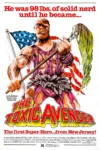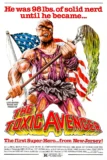 The Zero Boys (1986)
The Zero Boys (1986)
Directed by Nico Mastorakis, Zero boys starts with an opening theme that made me think of Rambo.
Clearly that was what the director was going for as within a few minutes we have someone trying to emulate Rambo complete with a bad impersonation.
So the Zero Boys are weekend warriors and the film begins with them, dressed as mercenaries in competition against another group dressed as Nazi’s.
Why not?
They win and part of the prize was the losing captains girlfriend Jamie has to spend the weekend with the Zero boys and their girlfriends on their trip.
She doesn’t know about and isn’t too happy but goes along anyway. It seems no-one is happy with this as one of the girlfriends shows when she says she wishes the boys had lost. Given the attitude of Jamie I’m thinking her boyfriend deliberately lost to get rid of her.
Like all films of this type we have the usual suspects. Jamie is the stroppy tough girl, well acts tough but berates others when something dangerous needs to be done including an injured woman at one point whilst breaking down at the first sign of danger.
We have Steve. The leader who’s far to good for Jamie yet puts up with her crap during the film. Not just hers, he’s blamed when the shit hits the fan despite the fact he constantly tells them when something is a bad idea or shouldn’t be done and they ignored him.
We have the joker of the pack and then we have the peripheral characters. That’s about as much as can be said for them.
So they set off on their trip where they hear a woman scream and whilst investigation they stumble upon a house that seems abandoned for the weekend.
Except it isn’t and despite the fact that they find evidence to the contrary (and Steve’s attempts to tell them why it’s wrong) they wonder in and make themselves at home.
Obviously this is the home to the killers but that isn’t a spoiler. We’ve seen more than enough films by now to know this.
For the first hour we only see brief glimpses of the killers and then only as silhouette’s. This is nicely done and sort of disappointing when you first see them in the light as they don’t look, or at least one of them doesn’t, as you would expect in a film like this. It might also be because he looks a lot like Martin Sheen and I only found out afterwards that it was Martin Sheens younger brother Joe Estevez.
There isn’t many deaths and the story is inconsistent at times but it has a nice look with the game of cat and mouse handled well enough.
Without giving anything away but once they realise they are in danger the film sets you up like you would expect but the outcomes are very different and unexpected to what we are used to.
Very refreshing.
I’m tired of the same old clichés and predictable plot elements that are now the norm especially in horror.
The Arrow Blu-ray I watched has a very good picture as anyone who has bought Arrow releases before will know.
Another 2K restoration that Arrow are doing for quite a lot with their releases as well as decent audio.
Packed with a good assortment of extras including the director interviewing himself and other new interviews with cast members made just for this release, if you’re a fan of the film or films like this I don’t see how you could be disappointed.
The Blu-Ray\DVD combo includes
DIRECTOR-APPROVED SPECIAL EDITION CONTENTS:
- Brand new 2K restoration of the film, approved by writer-director Nico Mastorakis
- High Definition Blu-ray (1080p) and Standard Definition DVD presentations
- Original Stereo audio (uncompressed PCM on the Blu-ray)
- Optional English subtitles for the deaf and hard of hearing
- Audio Commentary with star Kelli Maroney, moderated by Shock Till You Drop’s Chris Alexander
- Nico Mastorakis on… Nico Mastorakis – brand new interview with Mastorakis on the making of The Zero Boys
- Brand new interview with star Kelli Maroney
- Brand new interview with star Nicole Rio
- Original Theatrical Trailer
- Stills Gallery
- Reversible sleeve featuring original and newly commissioned artwork by Graham Humphreys
- Fully-illustrated collector’s booklet featuring new writing by critic James Oliver




